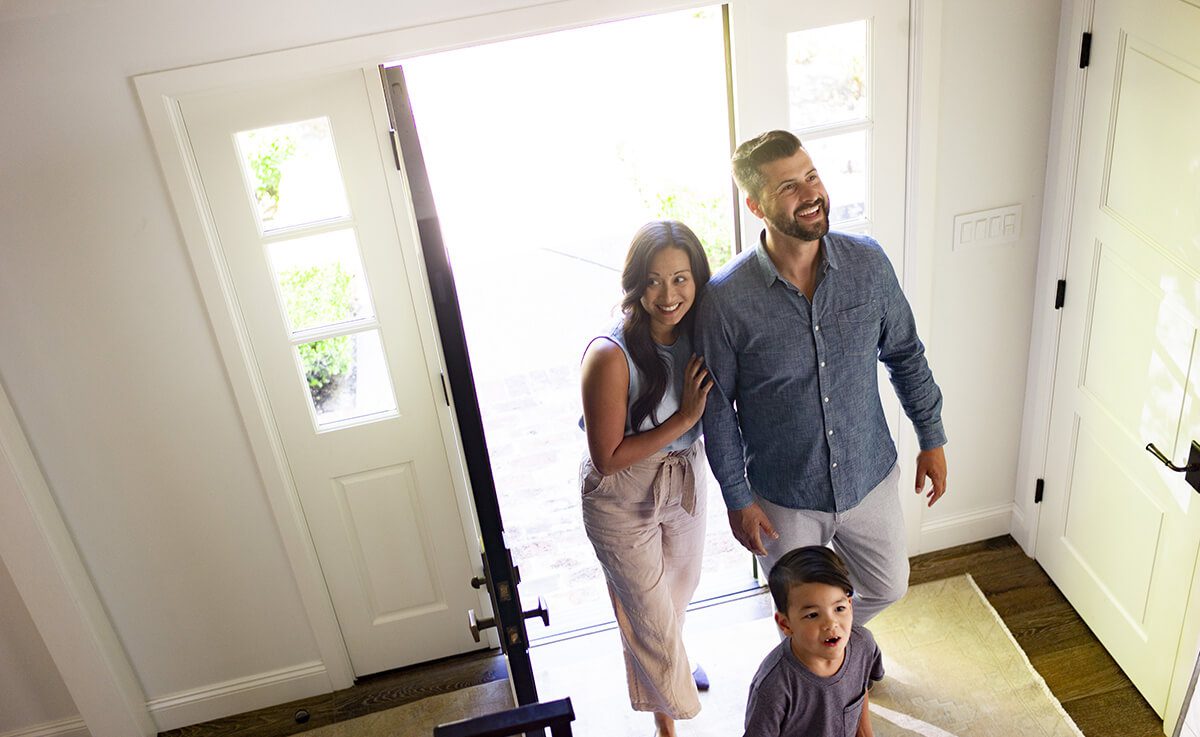Buying a home can be nerve-racking, especially if you’re a first-time home buyer.
These tips will help you navigate the process, save money and avoid common mistakes. We organized them into four categories:
-
Mortgage down payment tips.
-
Mortgage application tips.
-
House shopping tips.
-
First-time home buyer mistakes to avoid.
Mortgage down payment tips
1. Start saving for a down payment early
It’s common to put 20% down, but many lenders now permit much less, and first-time home buyer programs allow as little as 3% down. But putting down less than 20% may mean higher costs and paying for mortgage insurance, and even a small down payment can still be hefty. For example, a 5% down payment on a $200,000 home is $10,000.
Play around with this down payment calculator to help you land on a goal amount. Some tips for saving for a down payment include setting aside tax refunds and work bonuses, setting up an automatic savings plan and using an app to track your progress.
2. Explore your down payment and mortgage options
There are lots of mortgage options out there, each with its own combination of pros and cons. If you’re struggling to come up with a down payment, check out these loans:
-
Conventional mortgages They conform to standards set by the government-sponsored entities Fannie Mae and Freddie Mac, and require as little as 3% down.
-
FHA loans Loans insured by the Federal Housing Administration permit down payments as low as 3.5%.
-
VA loans Loans guaranteed by the Department of Veterans Affairs sometimes require no down payment at all.
Making a higher down payment will mean having a lower monthly mortgage payment.
If you want the smallest mortgage payment possible, opt for a 30-year fixed mortgage. But if you can afford larger monthly payments, you can get a lower interest rate with a 20-year or 15-year fixed loan. Use our calculator to determine whether a 15-year or 30-year fixed mortgage is a better fit for you. Or you may prefer an adjustable-rate mortgage, which is riskier but guarantees a low interest rate for the first few years of your mortgage.
3. Research state and local assistance programs
In addition to federal programs, many states offer assistance programs for first-time home buyers with perks such as down payment assistance, closing cost assistance, tax credits and discounted interest rates. Your county or municipality may also have first-time home buyer programs.
Mortgage application tips
4. Determine how much home you can afford
Before you start looking for your dream home, you need to know what’s actually within your price range. Use this home affordability calculator to determine how much you can safely afford to spend.
5. Check your credit and pause any new activity
When applying for a mortgage loan, your credit will be one of the key factors in whether you’re approved, and it will help determine your interest rate and possibly the loan terms.
So check your credit before you begin the homebuying process. Dispute any errors that could be dragging down your credit score and look for opportunities to improve your credit, such as making a dent in any outstanding debts.
To keep your score from dipping after you apply for a mortgage, avoid opening any new credit accounts, like a credit card or auto loan, until your home loan closes.
6. Compare mortgage rates
Many home buyers get a rate quote from only one lender, but this often leaves money on the table. Comparing mortgage rates from at least three lenders can save you more than $3,500 over the first five years of your loan, according to the Consumer Financial Protection Bureau. Get at least three quotes and compare both rates and fees.
As you’re comparing quotes, ask whether any of the lenders would allow you to buy discount points, which means you’d prepay interest up front to secure a lower interest rate on your loan. How long you plan to stay in the home and whether you have money on-hand to purchase the points are two key factors in determining whether buying points makes sense. You can use this calculator to decide whether it makes sense to buy points.
7. Get a preapproval letter
You can get pre-qualified for a mortgage, which simply gives you an estimate of how much a lender may be willing to lend based on your income and debts. But as you get closer to buying a home, it’s smart to get a preapproval, where the lender thoroughly examines your finances and confirms in writing how much it’s willing to lend you, and under what terms. Having a preapproval letter in hand makes you look much more serious to a seller and can give you an upper hand over buyers who haven’t taken this step.
House shopping tips
8. Hire the right buyer’s agent
You’ll be working closely with your real estate agent, so it’s essential that you find someone you get along with well. The right buyer’s agent should be highly skilled, motivated and knowledgeable about the area.
9. Pick the right type of house and neighborhood
You may assume you’ll buy a single-family home, and that could be ideal if you want a big yard or a lot of room. But if you’re willing to sacrifice space for less maintenance and extra amenities, and you don’t mind paying a homeowners association fee, a condo or townhouse could be a better fit.
But even if the home is right, the neighborhood could be all wrong. So be sure to:
-
Research nearby schools, even if you don’t have kids, since they affect home value.
-
Look at local safety and crime statistics.
-
Map the nearest hospital, pharmacy, grocery store and other amenities you’ll use.
-
Drive through the neighborhood on various days and at different times to check out traffic, noise and activity levels.
10. Stick to your budget
Look at properties that cost less than the amount you were approved for. Although you can technically afford your preapproval amount, it’s the ceiling — and it doesn’t account for other monthly expenses or problems like a broken dishwasher that arise during homeownership, especially right after you buy. Shopping with a firm budget in mind will also help when it comes time to make an offer.
In a competitive real estate market with limited inventory, it’s likely you’ll bid on houses that get multiple offers. When you find a home you love, it’s tempting to make a high-priced offer that’s sure to win. But don’t let your emotions take over. Shopping below your preapproval amount creates some wiggle room for bidding. Stick to your budget to avoid a mortgage payment you can’t afford.
11. Make the most of open houses
When you’re touring homes during open houses, pay close attention to the home’s overall condition, and be aware of any smells, stains or items in disrepair. Ask a lot of questions about the home, such as when it was built, when items were last replaced and how old key systems like the air conditioning and the heating are.
If other potential buyers are viewing the home at the same time as you, don’t hesitate to schedule a second or third visit to get a closer look and ask questions privately.
First-time home buyer mistakes to avoid
With so much to think about, it’s unsurprising that some first-time home buyers make mistakes they later regret. Here are a few of the most common pitfalls, along with tips to help you avoid a similar fate.
12. Not budgeting for closing costs
In addition to saving for a down payment, you’ll need to budget for the money required to close your mortgage, which can be significant. Closing costs generally run between 2% and 5% of your loan amount. You can shop around and compare prices for certain closing expenses, such as homeowners insurance, home inspections and title searches. You can also defray costs by asking the seller to pay for a portion of your closing costs or negotiating your real estate agent’s commission. Calculate your expected closing costs to help you set your budget.
13. Not saving enough for after move-in expenses
Once you’ve saved for your down payment and budgeted for closing costs, you should also set aside a buffer to pay for what will go inside the house. This includes furnishings, appliances, rugs, updated fixtures, new paint and any improvements you may want to make after moving in.
14. Buying a home for today instead of tomorrow
It’s easy to look at properties that meet your current needs. But if you plan to start or expand your family, it may be preferable to buy a larger home now that you can grow into. Consider your future needs and wants and whether the home you’re considering will suit them.
15. Passing up the chance to negotiate
A lot can be up for negotiation in the homebuying process, which can result in major savings. Are there any major repairs you can get the seller to cover, either by fully handling them or by giving you a credit adjustment at closing? Is the seller willing to pay for any of the closing costs? If you’re in a buyer’s market, you may find the seller will bargain with you to get the house off the market.
16. Not knowing the limits of a home inspection
After your offer is accepted, you’ll pay for a home inspection to examine the property’s condition inside and out, but the results will only tell you so much.
-
Not all inspections test for things like radon, mold or pests, so be sure you know what’s included.
-
Make sure the inspector can access every part of the home, such as the roof and any crawl spaces.
-
Attend the inspection and pay close attention.
-
Don’t be afraid to ask your inspector to take a look — or a closer look — at something. And ask questions. No inspector will answer the question, “Should I buy this house?” so you’ll have to make this decision after reviewing the reports and seeing what the seller is willing to fix.
17. Not buying adequate homeowners insurance
Before you close on your new house, your lender will require you to buy homeowners insurance. Shop around and compare insurance rates to find the best price. Look closely at what’s covered in the policies; going with a less-expensive policy usually means fewer protections and more out-of-pocket expenses if you file a claim. Also, flood damage isn’t covered by homeowners insurance, so if your new home is in a flood-prone area, you may need to buy separate flood insurance.
-





